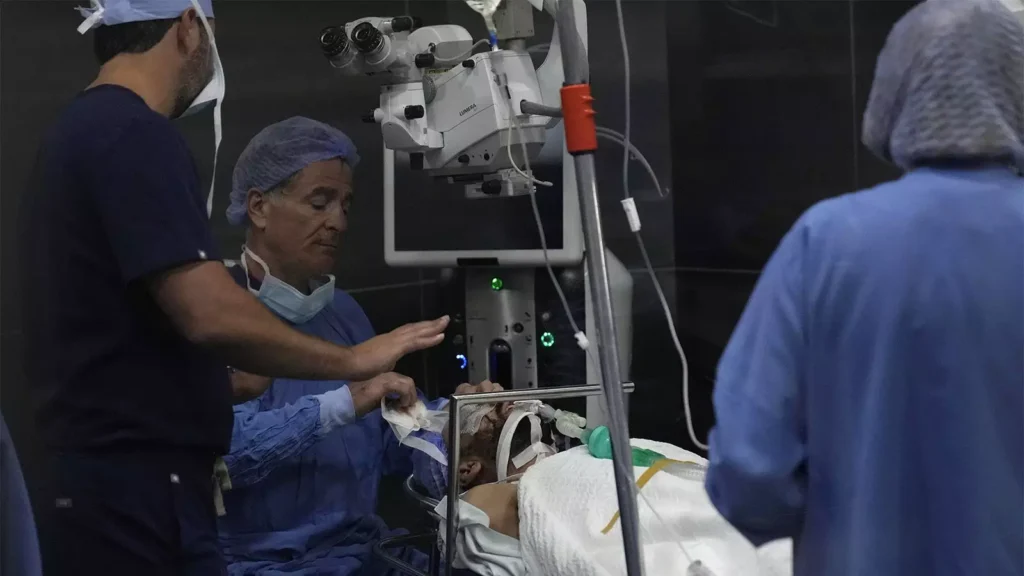Key Points
- Lebanon is facing a surge of eye injuries caused by explosions of communication devices, particularly pagers and walkie-talkies.
- Dr. Elias Jaradeh, an ophthalmologist and reformist lawmaker, is working tirelessly to treat victims of severe eye trauma.
- The explosions have resulted in at least 39 deaths and around 3,000 injuries, with hospitals struggling to cope.
- The healthcare system, already fragile, is overwhelmed by the volume of injuries, and medical professionals are emotionally drained.
- The event has intensified political tensions in Lebanon, with speculation about external involvement, highlighting the urgent need for healthcare and political reforms.

The Invisible Toll of Lebanon’s Political Turmoil: Surge in Eye Injuries from Device Explosions
Lebanon is once again witnessing the devastating consequences of its ongoing political instability. In recent days, hospitals across the country have been overwhelmed by a disturbing wave of eye injuries caused by a series of explosions involving communication devices. Pagers and walkie-talkies, widely used by Hezbollah militants, detonated unexpectedly, resulting in an unprecedented number of casualties.
Eyewitnesses describe scenes of chaos as hospitals struggle to manage the flood of patients. Dr. Elias Jaradeh, an ophthalmologist and reformist lawmaker, has been at the forefront of this medical crisis. With only minimal sleep, he has performed countless surgeries to treat the victims, many of whom are suffering from severe eye trauma. Dr. Jaradeh’s account of the situation paints a grim picture of Lebanon’s healthcare system, already weakened by years of conflict, now teetering on the edge under the strain of this latest disaster.
Unprecedented Scale of Injury
The explosions, reportedly triggered when users were distracted by incoming messages, have left hospitals grappling with the sheer volume of casualties. At least 39 people have died, and approximately 3,000 others have sustained injuries, with eye injuries being particularly prevalent. Medical experts have drawn comparisons to the Beirut port explosion four years ago, but the nature of these injuries—caused by shrapnel from the devices—adds a new and tragic dimension to the crisis.
Dr. Jaradeh, who has long been a vocal advocate for healthcare reform in Lebanon, described the influx of young men, women, and even children with eye injuries as “devastating.” Many of the patients he treats have shrapnel embedded in their eyes, a complication that makes surgery both delicate and urgent. The injuries range from partial vision loss to complete blindness, raising concerns about the long-term prospects for recovery.
A Strained Healthcare System
Lebanon’s healthcare system has long been under immense pressure due to the country’s political instability and economic collapse. The current crisis, however, has brought these issues to a head. With hospitals already operating at limited capacity and medical supplies in short supply, the influx of patients from this latest series of explosions has pushed the system to its breaking point.
Dr. Jaradeh, who previously played a pivotal role during the aftermath of the Beirut port explosion, remarked on the overwhelming nature of this new challenge. “It’s not just the scale of the injuries,” he said. “It’s the fact that these were not caused by conventional weapons but by devices that are supposed to be used for communication, not destruction. It’s a new kind of tragedy.”
The emotional toll on healthcare workers has been severe as well. Dr. Jaradeh admitted that maintaining emotional detachment in such a scenario is nearly impossible. “When you’re treating young people who have lost their sight, it’s hard not to think about the future they’ve lost. It’s a burden that stays with you,” he said.
Broader Implications of the Crisis
The explosion of these devices has not only caused widespread physical harm but has also intensified Lebanon’s existing political tensions. Speculation about the involvement of external forces, including Israel, in the detonation of the devices is rife, although no definitive evidence has been presented. However, for the victims and their families, the focus remains on the immediate aftermath—the loss of life, the debilitating injuries, and the emotional trauma.
This latest tragedy serves as a stark reminder of Lebanon’s prolonged suffering and the urgent need for both local and international intervention to support the country’s healthcare infrastructure. Mental health resources, in particular, will be essential in helping healthcare workers and victims cope with the long-term effects of the crisis.
The crisis highlights the need for urgent reform, not only in healthcare but also in addressing the political instability that has made Lebanon so vulnerable to such tragedies. Without meaningful change, Lebanon risks continued cycles of devastation, each more damaging than the last.